Related Research Articles
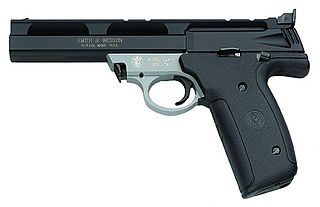
The Smith & Wesson Model 22A is a semi-automatic pistol that was manufactured in Houlton, Maine. The 22A is a full-size pistol with an aluminum alloy frame. The steel barrel has an integrated Weaver style rail.

The Smith & Wesson 5906 is a pistol manufactured starting in 1988 by Smith & Wesson.

The Smith & Wesson Model 469 is a semi-automatic pistol, chambered for the 9mm cartridge.

The Smith & Wesson Models 908, 908s, 909, 910, and 915 are 9×19mm Parabellum, short-recoil-operated double-action/single action (DA/SA) semi-automatic pistols Value Series pistols. All of these pistols utilize a stainless barrel, an aluminum alloy frame, and either a carbon steel or stainless steel slide. The S&W Model 915 was produced from 1992 to 1994, while the S&W Model 910 was introduced in 1995 as a replacement for the Model 915 and was manufactured through 2006.

In American English, a pocket pistol is any small, pocket-sized semi-automatic pistol, and is suitable for concealed carry in a pocket or similar space.
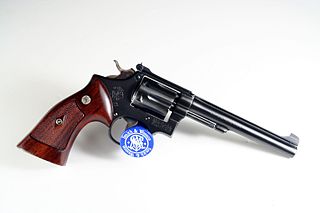
The Smith & Wesson Model 17 is a six-shot double-action revolver chambered for .22 LR. It is built on Smith & Wesson's medium-sized K-frame.
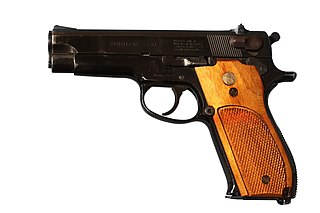
The Smith & Wesson Model 39 is a semi-automatic pistol developed for the United States Army service pistol trials of 1954. After the Army abandoned its search for a new pistol, the Model 39 went on the civilian market in 1955 and was the first of Smith & Wesson's first generation semi-automatic pistols. A modified version saw limited use with Naval Special Warfare units as the Mk 22 Mod 0.

The S&W Model 4006 is a semi-automatic handgun introduced by Smith & Wesson on January 17, 1990 along with the new .40 S&W cartridge. It is a 3rd-generation S&W pistol.

The Colt Commander is a single-action, semi-automatic, magazine-fed, and recoil-operated handgun based on the John M. Browning–designed M1911. It was the first mass-produced American pistol with an aluminium alloy frame and the first Colt pistol to be chambered in 9mm Parabellum.

A snubnosed revolver is a small, medium, or large frame revolver with a short barrel, generally less than 4 inches in length. Smaller such revolvers are often made with "bobbed" or "shrouded" hammers and there are also "hammerless" models ; the point is to allow the gun to be drawn with little risk of it snagging on clothing. Since the external movement of the mechanism is minimal or nil, shrouded and hammerless models may be fired from within clothing. The design of these revolvers compromises range and accuracy at a distance in favor of maneuverability and ease of carry and concealment.

The Colt Double Eagle is a double-action / single action, semi-automatic pistol manufactured by Colt's Manufacturing Company between 1989 and 1997. It was available in standard full-size, as well as in more compact versions. It featured a decocking lever, and was chambered for several calibers. The family of models was known as the Series 90.

The Smith & Wesson Model 457 is a compact semi-automatic pistol from Smith & Wesson's Third Generation series of alloy and steel-framed handguns in company's Value Line of budget-priced auto pistols. The 457 is a compact pistol chambered for the .45 ACP cartridge. The design utilizes a double-action/single action trigger mechanism, meaning that the first shot is fired with long double-action pull, with following shots fired in single-action. The 457's external hammer omits a thumb spur, thereby reducing the risk of being caught on clothing during unholstering. A slide-mounted safety lever that drops the hammer from its cocked position when moved to the 'safe' position. The 457 has a 95 mm (3.75 in) barrel and 7-round magazine capacity. The Model 457 was produced with a matte-finish carbon steel slide and blackened aluminum alloy frame. Other versions include the Model 457S with a stainless steel slide and aluminum frame, and the Model 457TDA with a satin-finished aluminum frame and black carbon steel slide.

S&W Centennial is a family of revolvers made by Smith & Wesson on the "J-Frame". Depending upon caliber, the cylinder holds either 5, 6, 7, or 8 cartridges. Centennials feature a fully enclosed (internal) hammer, which makes them Double Action Only (DAO) firearms. Like all other "J-frame" Smith & Wesson revolvers, they have a swing-out cylinder. Centennial models have been made in different versions like PD "Personal Defense", LS "Lady Smith", and M&P "Military & Police"

A handgun is a firearm designed to be usable with only one hand. It is distinguished from a long gun which needs to be held by both hands and braced against the shoulder. The two most common types of handguns are revolvers and semi-automatic pistols, although other types such as derringers and machine pistols also see infrequent usage.
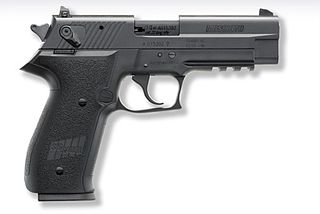
The SIG Sauer Mosquito is a blowback-operated, semi-automatic pistol aesthetically based on the SIG Sauer P226, but 10% smaller in size and chambered for the .22 LR cartridge. The pistol is manufactured with an aluminum-zinc alloy slide and polymer frame. The controls are similar to those present on full-size models and include a left takedown lever, a left decocking lever, reversible magazine catch and ambidextrous manual safety. In addition, the pistol is provided with an integral safety lock located at the rear of the magazine well which when enabled prevents cycling of slide, hammer fall, and trigger action. The pistol is available in five different configurations: Standard model, Sport, Threaded barrel, Two-tone, Reversed two-tone, and four special editions having different colors.
The Smith & Wesson 340PD is an ultra-light J-frame five shot snubnosed revolver chambered for .357 Magnum.

The Model 610 is a six-shot, double-action revolver chambered for the 10mm Auto cartridge.
The Smith & Wesson 645 and Smith & Wesson 745 are second-generation semi-automatic pistols which predate Smith & Wesson's 4500 series of handguns. The S&W 645/745 is chambered for the .45 ACP cartridge. The S&W 645 is constructed almost entirely from stainless steel and is thus extremely resistant to harsh weather conditions, whereas the S&W 745 has a stainless steel frame and a blued carbon steel slide. The S&W 645 was introduced in 1985 and discontinued in 1988. The S&W 745 was produced from 1986 to 1990, primarily as a single-action competition gun for IPSC shooting.
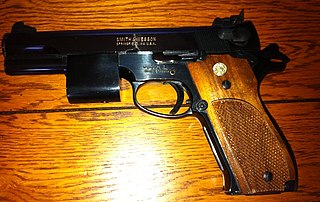
The Smith & Wesson Model 52, sometimes referred to as the 38 Master, is a semi-automatic pistol developed by Smith & Wesson for Bullseye shooting. It was one of the first semiautomatic pistols chambered in .38 Special with flush-seated, full wadcutter bullets. The shape of the rimmed cartridge limited the magazine capacity to five rounds. A variant, known as the Model 952, in 9 mm Parabellum, is still produced in limited quantities by Smith & Wesson's Performance Center. The Model 52 was discontinued in 1993 when the machinery to manufacture the pistol broke down and it was deemed too costly to replace.

The Smith & Wesson Governor is a snub-nosed single-action/double-action revolver built on the Z-frame and utilizes a K-frame grip with a lightweight scandium alloy or stainless steel frame.
References
- ↑ Shideler, Dan (2009). The Gun Digest Book of Modern Gun Values: The Shooter's Guide to Guns 1900-Present. Iola, Wisconsin: Gun Digest Books. p. 227. ISBN 0-89689-824-5.
- 1 2 Supica, Jim; Nahas, Richard (2007). Standard Catalog of Smith & Wesson. Iola, Wisconsin: F+W Media, Inc. p. 319. ISBN 0-89689-293-X.